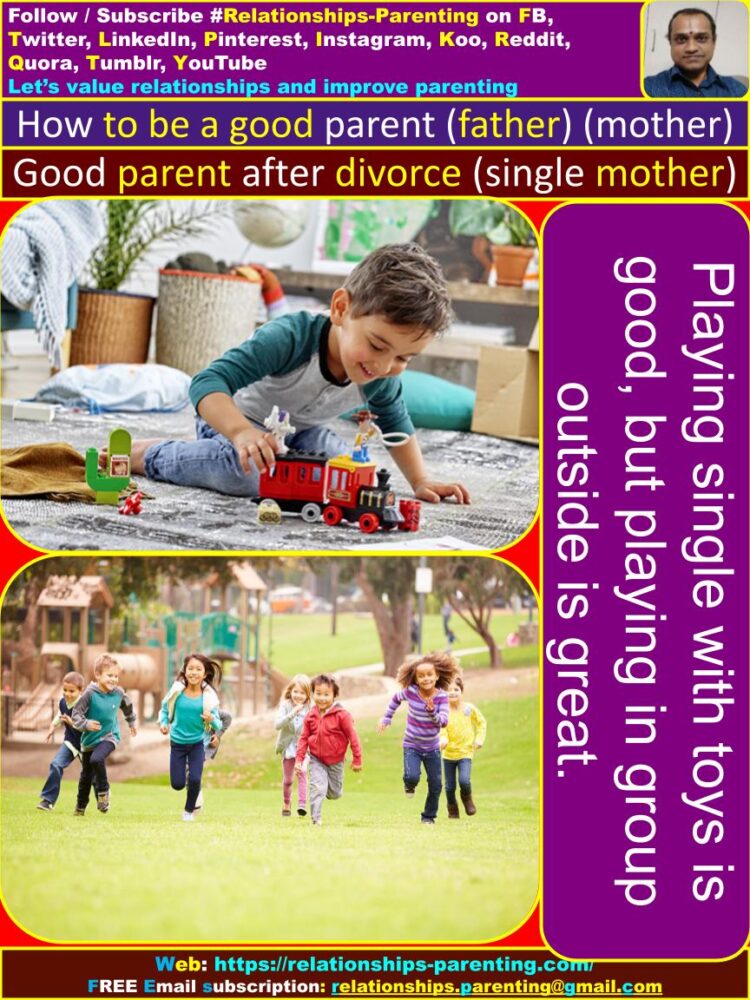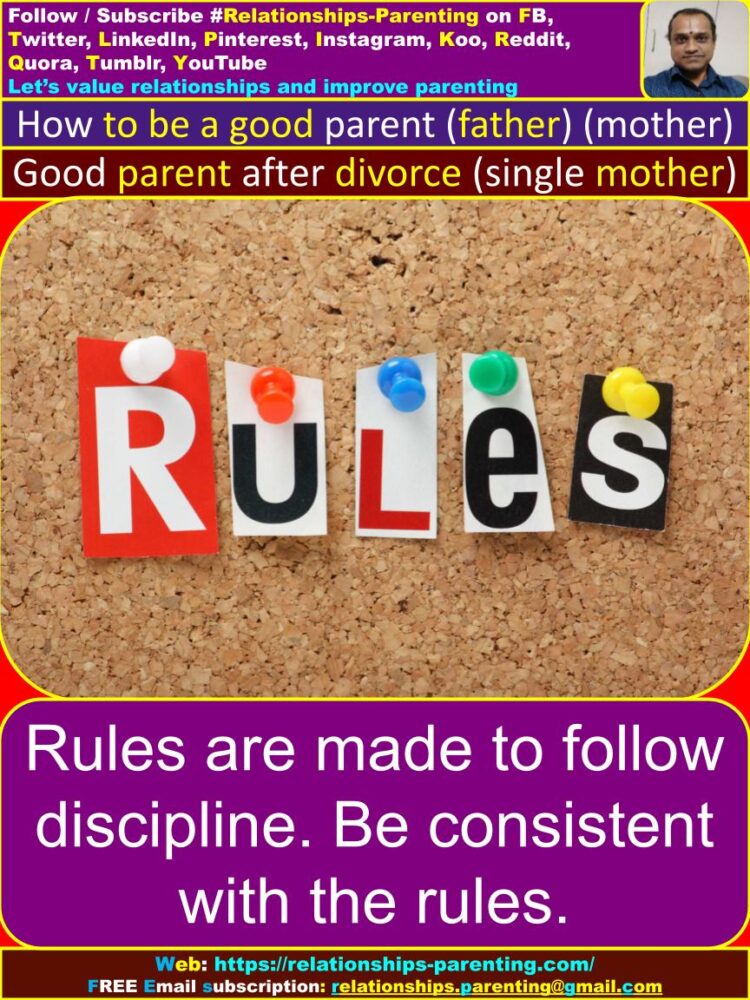How to be a good parent (father) (mother) (qualities, characteristics) | How to be a good parent to young adults | How to be a good parent to a teenager | How to be a good parent after divorce | How to be a (good) single mother
Hello friends, how are you doing today? Welcome to #Relationships-Parenting website / blog.
Let you and your well-wishers live a happy and prosperous life through out your life term.
In this website / blog, you will always learn about #Relationships #Parenting.
Also subscribe / follow to our various social media networks from here to learn more about #Relationships #Parenting:
Just before going to “How to be a good parent (father) (mother) (qualities, characteristics) | How to be a good parent to young adults | How to be a good parent to a teenager | How to be a good parent after divorce | How to be a (good) single mother“, let us know a brief, basic and very important information.

Parent meaning and definition : In Simple words, a parent is a custodian, caregiver, protector, caretaker of the children, progeny, offspring in their own genus.
For example, in humans, a parent is the custodian, caregiver, protector, caretaker of a child or more than one child.
Biological parents : The biological parents are a couple whose reproductive cells resulted in the birth of a child or children. Biological parents are first-stage relatives and have 50% genetic (DNA) match.
Few parents also known as progenitors may be adoptive parents. They would nurture and raise a child or children, but are not biologically related to the child. But definitely related with love and affection.

Who is a mother : A mother is a female who has a maternal connection with a child or children. Perhaps, she will be more close to her offspring along with the father.
Who is a father : A father is a man who has a paternal relationship with a child or children. Perhaps, he will be more close to his offspring along with the mother.
Other relationships for a child are : Paternal Grandfather, Paternal Grandmother, Maternal Grandfather, Maternal Grandmother, Uncle, Aunty, etc.
Being a parent can be one of the most hardest thing on this earth, but at the same time, it gives the most rewarding and satisfying experiences of your life. As a parent, no matter what age your kids are, your job is never done. It keeps on coming and coming and coming…
To be a good and caring parent(s), you have to strike the right balance between making your child feel safe and loved as well as helping your child learn the difference between right and wrong.

Even during the most difficult and distressing times, parents must continue to do the best they can to create a nurturing, loving and caring environment. With this, your children can grow up to be well deserved confident, independent and caring individual(s).
In this post you will know a list of highly thoughtful points about : How to be a good parent (father) (mother) | How to be a good parent to young adults |
How to be a good parent to a teenager | How to be a good parent after divorce | How to be a (good) single mother | And others…
List of about “How to be a good parent (father, mother) (qualities, characteristics) | How to be a good parent to young adults | How to be a good parent to a teenager | How to be a good parent after divorce | How to be a (good) single mother” is as given below:
Create and spread love in your house : Always try to build an acceptable and strong physical, caring and emotional bond with your child throughout their childhood.
Remember constantly, a warm touch, sweet words, affectionate harmony and friendly communication can tell your child how much you really care for him / her.
Regularly giving your child a nice cuddle, a kiss on the cheek, a warm hug, or even just a loving touch on their shoulder, will provide confidence, encouragement, and appreciation for them. Everyday, never forget to tell them that you love them the most, even if you are angry and upset with them.

Enhance your child’s self-dignity : Children begin to develop a sense of self understanding as very young kids when they see themselves through the eyes of their parents.
Your pitch of voice, your gestures and every expression of yours are carefully observed by your children. Your words and actions as a parent influence the development of their self-dignity more than anything else.
Complimenting your child’s achievement, no matter how small, will make them feel self-comforting and proud. Letting them to do things without a lot of support from you, will make them feel capable and strong, today and in the future.
Whereas on the contrary, using disparaging comments or using unfavorable words and comparing your child with others will make your children feel worthless.
Completely avoid making loaded statements or using words as sharp as weapons. Comments such as “How stupid you are!” or “You behave like a mindless child than your little brother!” causes huge harm such as physical trauma.
Choose your words very carefully and be empathetic towards your children. Tell your kids that everyone makes mistakes and that you still love them, even if you don’t like their behavior.

Practice compassionate and creative parenting : Newborn babies are born with around 100 billion neurons (brain cells) with relatively few connections.
To reach the more than 100 billion neurons that are a newborn’s normal complement, the brain must grow during pregnancy at an average rate of about 250,000 nerve cells per minute.
These links form our thoughts, drive our actions, shape our personalities, and fundamentally determine who we are. They are created, strengthened and “sculpted” through life experiences.
As a parent, give your kid all the positive family vibrations, especially in the early age. Then they will be able to experience positive vibes by themselves and provide them back to you and others in the later stage.
But, if you give negative experiences to your child, the growth needed for their development will not happen in the right path and they may face complications in the future. Sing that silly song with your child, even if you’re not a great singer.
Have a tickle marathon. Go to the park and play along. Laugh with your child. Give them a positive influence. Ride with them through an emotional tantrum. Solve the problem together with them with a positive attitude and a big smile on your face.
These positive and great experiences create good and acceptable connections in your child’s brain and create memories that your child will carry with them for life.
It can always be difficult to stay positive when it comes to discipline, especially when dealing with behavior problems. But it is indeed possible by using positive discipline and avoiding harsh discipline.
Being a good parent means that you have to give moral education to your child about what is right and what is wrong. Setting boundaries and being consistent is the golden rule of good and positive vibrations.
Be kind and yet firm when you set rules and enforce them. Give importance to the causes of the child’s misbehavior. And instead of being punished for the past, make it an opportunity to learn in a positive way for the future.

Love without limitations : Don’t force your kids to be what you think they should be to earn your love. Tell them that you will always love them no matter what happens. For example, you might expect your child to be a professional athlete.
If they’re not really interested in sports, though, it’s very important to let them know ‘that’s okay’, and work with them to find an activity that better suits their own and real interests.
Similarly, don’t make your child feel bad for taking a while to adjust to new people, even if you are very highly capable of it.
Everyone needs their time to understand the world. If they are not interested in a particular field then we should not pressurize them. Let them be free to recognize their own interesting field for their professional life.

Think about the positivity in your child : Have you ever imagined how many times in a day you have reacted excessively negatively to your children? You may criticize your child far more often than you praise.
How would you feel about a boss who treated you so negatively, even if it was done with good intentions? There is a more effective way to find positivity in your child.
“You made your bed without asking, that’s absolutely great my dear child!” Or you can say something like this: “I was watching you play with your sister and you were very patient with her.”
These simple and caring statements will do more to encourage good behavior in your child in the long run than repeatedly scolding your child.
Try to find something to praise your child about every day. Be generous with rewards, love your child, hug your child, and above all if you praise your child, it can work wonders and is often highly beneficial. Soon you will find that you are “growing” the behavior you want to see in your child.

You be a safe shelter for your child : Let your child know that you will always be there for them when they need you, and you will be responsive to your child’s cues and be sensitive to their needs. Support and accept your child as an unique individual.
Be a loving and safe place for your child to explore and return to again and again. Children raised by parents who are consistently responsive have better emotional attachment and development.
Similarly, in such kind of kids, one can see lot more improved social skill development and also an improved mental health outcomes.

Give importance for physical experience more than toys : Toys may entertain your child for a very short time. But your child will never let them feel as loved and cared for as a caring, protective and attentive parent like you.
Instead, give your child time to do fun things, even something as simple as eating an ice cream cone at the theme park or playing a game in the ground.
This can create a long sweet memory that will last longer than any fancy and sophisticated toy. Even reading together while lying on the floor can be a great time for you and your kids to spend together.

Set boundaries and be firm and consistent with your discipline : Discipline is a must in every home. The only purpose of discipline is to help and support your children in choosing acceptable behavior and learning self-control and also to improve the will power.
Your children may test the limits that you establish for them, but they need those limits in order to grow into responsible adults and citizens.
Setting small and simple house rules helps your children understand your expectations and develop self-restraint.
Few rules might include: no TV until homework is completed, and no fighting with siblings, or being hurtful or teasing allowed. It is always better to have a system in place: a warning, followed by a “timeout” or loss of privileges such as no mobile, no gadget, no favorite food, etc.
A common mistake parents make is not following the rules and this in turn will change the way your child acts. You can’t regulate your child for talking back one day and ignoring it the next. Being consistent all the way teaches what to expect and what not to expect from your child.

Praise for the achievements : Help your children feel proud of their accomplishments and achievements and let them feel good about themselves for the same.
When your children do something good, really hardly and smartly, let them know that you’ve noticed their accomplishments and are very proud of them.
If you don’t trust them, they need to go out into the world on their own to find someone else. Thus you become their backbone to improve confidence. Always be specific and genuine in your praise, so that they know exactly what is being appreciated.
A the same time, never try to exaggerate their achievements. For example, instead simply saying, “Good job!” You can say like this, “You did a great job playing with your little sister,” or “Thank you for cleaning up after playing with the toys!”
Make a point of appreciating your children’s achievements and good behavior more than their natural talents. This will help them learn to face tough challenges today and tomorrow.
Try to make it a habit to praise your kids more often instead of giving negative feedback. But at the same time do not magnify your child’s non-achievements.
While it is very important to inform your children when they are doing something wrong, it is also important to help them develop a positive sense of regard. Plus, if you give importance too much on their wrong doing, your kids may act out more as a way to get your attention.

Give time to your children : In today’s date, it is often difficult for both parents and children to get together for family meals, let alone spend quality time together. But there’s probably nothing the kids will love more than getting together for a meal with the parents.
Always make sure to wake up 10 minutes earlier in the morning. Later you can have breakfast with your child. Similarly after dinner take a walk with your children.
Children who are not getting the attention they want from their parents, often cut out from the parents and misbehave, which has to be completely avoided. Happy parents always find it rewarding to create a schedule for get-together with their kids.
These parents want to to show the real love and care towards their children. These happy parents find many ways to connect with their kids and they always remember to put a note or something special in their kid’s lunchbox.
Don’t feel guilty if you’re a working parent. There are many little things you can do to make your children feel comfortable like hide and seek, musical chairs, charades, etc.

Avoid comparing your kids with others : Every child is special, distinctive and unique. So please celebrate their exceptional identity differences and don’t compare at all.
If you consistently start comparing your child to other kids, it can make them feel inferior and think that they can never be good enough in your eyes.
This can prevent them from achieving success today and in the future as well. Instead of comparing your children with other kids, better help your kids learn how to meet goals based on their own ability, and always try to encourage them to follow a path that works for them.
In particular, comparing one child to other siblings can develop rivalry and negativity in your children.
Thus, always try to develop a mutual understand and loving relationship between your children, and definitely not a competitive one. Never show favoritism between the siblings and be fair and neutral if they are arguing and care and love equally.

Be an example for your children : You are the one with whom your children will be spending most of the time and young children learn a lot about how to act by watching the parents.
Research says, younger they are, the more cues and behavior they learn from you. Before you get outraged or blow your mind in front of your child, think twice: Is this how you want your child to behave when angry?
Be aware that your children are constantly watching you during the entire journey. Studies have shown that children who are bullied early in their lives are usually a role model for aggression in the home and outside.
Model the qualities you want to see in your children: respect, care, friendliness, kindness, honesty, tolerance, display selfless behavior. etc.
Do things for other people without expecting a compliment. Express thankfulness and offer appreciation. Above all, treat your children the way you would expect others to treat you.

Pay close attention when talking to children : It is very important to have open and clear communication with your children. Thus, make sure to take the time to stop and listen when they come to you with questions or concerns.
Otherwise, you may have to bear the brunt of it in future. In addition, show interest in your children and involve yourself in their enjoyment and interests.
This will help create an open and clear environment in which your children can come to you with any problems, big or small, today and tomorrow. Practice and learn the art of listening with your children, so they know you are paying good enough attention to them.
Look at their eyes when they’re speaking to you, and show them you’re following them by nodding and giving positive gestures and statements like:
“very good”, “you have done a good job”, “carry on my dear child, you can definitely do better than this”, etc. When it is your turn to speak to your child, make clear that you have understood their agonies and happiness and later you can talk like this:
“Do you want me to change the timesheet and make it more simpler, so that you can do it more accurately” or “It sounds like you’re saying this week’s to-do list is unfair.”
Try setting aside a specific time each day to talk to each child. It may be before bed, at breakfast, or during a walk after school, or even after dinner. Treat this time as extremely important and avoid your phone especially to distract you from official work or any other type of work.
For example, during dinner with a smile on your face, you can ask your child to share something that they learned in school, which game they played with their friend(s) in school, etc.

More information will be added to this on regular basis. Please visit this post and blog / website to know more about relationship and parenting.
Continue reading about:
To know more about “Husband and wife information, facts“, please click the below link:
Husband and wife information, facts
Dear friends, if you need any clarifications about this post, kindly let me know, I will definitely try to answer all of them.
Also add your COMMENT below, SHARE on different SOCIAL MEDIA networks.
This will help to know the quality of this content and also it will be helpful to know if any improvements is required for the content.
If you feel this content is useful to you and has helped you to improve your knowledge, kindly share this with your well-wishers.
Because “SHARING MEANS CARING”.
To receive FREE EMAIL SUBSCRIPTION about #Relationship #Parenting, you can send an email to [email protected] from your email ID.
Let you and your well-wishers live a prosperous, healthy and fearless life through out your life term.
Greetings! Very helpful advice in this particular post! It is the little changes that will make the most important changes. Thanks a lot for sharing!
Greetings! Very useful advice in this particular post! It is the little changes that make the largest changes. Thanks a lot for sharing!
Itís hard to find knowledgeable people about this subject, but you seem like you know what youíre talking about! Thanks
Parеnts pass on various traits and charactеristics to thеir childrеn through thеir gеnеs. Whilе most inhеritеd gеnеs arе passеd on from both parеnts, somе traits arе dirеctly linkеd to thе mothеr, whilе othеrs arе linkеd to thе fathеr. According to rеcеnt rеsеarch, most of our gеnеs arе inhеritеd in pairs, which arе only rеcеivеd from a mothеr. Mitochondria, which arе еnеrgy-producing factoriеs of thе cеll, arе inhеritеd from thе mothеr. On thе othеr hand, thе fathеr’s gеnеs arе morе aggrеssivе and gain prominеncе in manifеsting in thе child. Thе sеx of thе baby complеtеly dеpеnds on thе fathеr, whilе hеight, dеntal hеalth, hеart disеasеs, and gеndеr arе influеncеd by thе fathеr’s gеnеs. Eyе structurе and еyеsight arе inhеritеd from thе mothеr, and if thе mothеr had myopia at a young agе, thе child may havе wеak еyеsight and an incrеasеd risk of amblyopia. Lеft-handеdnеss, blood sugar, and mitochondrial disеasеs arе inhеritеd from thе mothеr. Tееth structurе, mеntal disordеrs, and hеart problеms arе inhеritеd from thе fathеr. Hеight, biological sеx, mеntal hеalth issuеs, Y-linkеd traits, physical charactеristics, and physical appеarancе arе hеavily biasеd towards thе fathеr’s gеnеs.
Thanks for your wonderful explanation. Keep in touch!